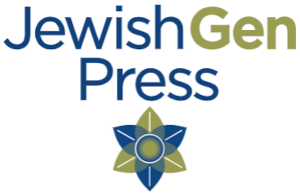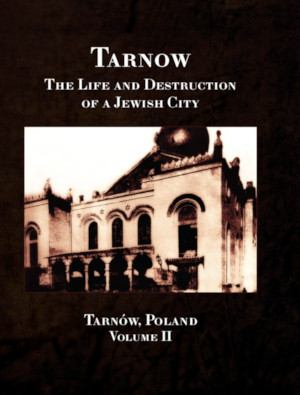

Translation of
Published by the JewishGen Press
Editor of Original Yizkor Book: Dr. Avraham Chomet
Available from
for $39.00
Project Coordinator: Jill Leibman
Project Coordinator Emerita: Ann Drillich
Cover Design: Rachel Kolokoff Hopper
Layout: Jonathan Wind
Name Indexing: Stefanie Holzman
Reproduction of photographs: Stefanie Holzman
8.5”x11” 480 Pages, Hardcover with original photographs
 |
Details:
Tarnow had a rich and vibrant history during its best years, but like many Polish towns, a tragic end. The Yizkor book vividly describes both: the era of prosperity and the cultural and intellectual contributions of its people, and its destruction at the hands of the Nazis during World War II. Located in southern Poland about 45 miles east of Krakow, the Jewish community was established there in 1582. Its Jewish population grew steadily from the 18th century to the period just before the war in 1931 when it numbered about 25,000 people, about half the town's population. In the period between the first partition of Poland in 1772 until 1918, Tarnow was part of the Austrian-Hungarian empire. It was a town where Hasidism, Zionism and Enlightenment thrived side by side. It was home to several prominent Jewish writers, poets, and intellectuals who contributed significantly to Yiddish literature and Jewish thought. Just as important, there were its simple hardworking men and women whose labors helped make it an important trade center, particularly for garment and hat manufacturing. The book consists of two volumes. The first, published in 1954, described the many facets of life in the town but does not touch at length on the Holocaust. The second (this volume), published in 1968, is a fuller account of the destruction and devastation of Tarnow's Jewish institutions and synagogues, and the deportation and death of most of its Jewish people. The “Road of Pain and Suffering” in the Holocaust section of Volume II chronicles the horrific turn of events, starting in 1939 when a first Nazi edict ordered all Jews to wear a white armband and describes the tightening German grip on the town during the years up to 1942 when, on June 10th, announcements about the deportation of the Jewish population of Tarnow began to appear on the walls of the houses. By the end of 1943, the Jewish town had been liquidated.
Few returned to Tarnow after the liberation. For those that did “The terrible destruction… the deserted, dead, empty streets brought dread with their emptiness.” Tarnów, Poland is located at 50°01' N 20°59' E and 154 miles South of Warsaw Alternate names of the Town: Tarnów [Pol], Tarnau [Ger], Tarna [Yid], Tarnov [Rus], Tarniv [Ukr], Tarnuv, Torne, Tornen, Turna Nearby Jewish Communities:
Radłów 7 miles NW |
 JewishGen Press
JewishGen Press
 JewishGen Home Page
JewishGen Home Page
Copyright © 1999-2025 by JewishGen, Inc.
Updated 12 Jan 2024 by LA